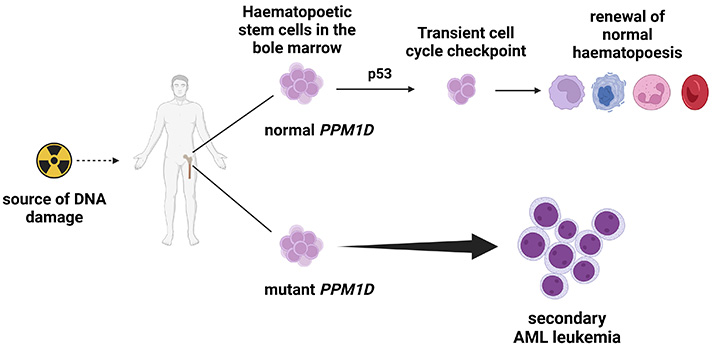Thanks to the combined efforts of two departments of the Institute of Molecular Genetics of the Czech Academy of Sciences, a new cause of cancer, specifically leukaemia, has been discovered. Experts identified new mutations in the PPM1D gene that sabotage the work of the ‘guardians’ of the human genome, enabling cancers cells to spread rapidly. The research shows that these findings can also be used to fight leukaemia.
Acute myeloid leukaemia is a common cancer of the haematopoietic tissue. Researchers from the Laboratory of Cancer Cell Biology (Dr. Macůrek) and the Laboratory of Haematooncology (Dr. Meritxell Alberich Jordà) of the Institute of Molecular Genetics of the Czech Academy of Sciences identified a new mechanism contributing to the development of this disease. “This is the perfect example of how joining forces and expertise from two labs can help us in advancing our understanding of the mechanisms driving cancer and allowing us to think about novel and efficient cancer therapies”, says Dr. Alberich Jordà. Results of this study have recently been published in the prestigious journal Leukemia.
Genetic information in our cells is protected by a series of sophisticated control mechanisms that prevent the accumulation of unwanted mutations and the development of cancer. One of the main guardians of our genome is the p53 protein, which eliminates cells with damaged DNA. In cancer cells, p53 function is often impaired, allowing them to divide uncontrollably.
Scientists at the Institute of Molecular Genetics of the Czech Academy of Sciences have found a new mutation in the PPM1D gene that suppresses the natural function of the p53 protein, allowing damaged cells that would normally be destroyed in our bodies to survive.
Mutations can be present even in healthy people, the key is in which tissues they occur
These PPM1D mutations can be present in a small percentage of cells even in healthy people and normally do not cause any problems. A problem can arise if the mutated form of PPM1D is found, in a stem cells in bone marrow, which is responsible for making blood. If the carrier of such a mutation is repeatedly exposed to ionising radiation or other sources of DNA damage, the affected stem cells continue to divide and leukaemia develops.
“We have verified the importance of PPM1D for the development of leukaemia in mouse models, but the same mutations have also been found in patients suffering from certain special types of leukaemia,” explains Libor Macůrek from the IMG.
Research in mice has also shown that the function of the p53 protein can be restored in these tumour cells by targeted therapy. “In future research, we will therefore focus on the possibility of using the PPM1D protein as a suitable therapeutic target in leukaemias as well as in other types of cancer,” adds Dr. Macůrek. Furthermore, research in mice has shown that the function of the p53 protein can be restored in these tumour cells by targeted therapy. “In future research we will therefore focus on the possibility of using the PPM1D protein as a suitable therapeutic target in leukaemias as well as in other types of cancer,” adds Dr. Macůrek.

Burocziova M, Danek P, Oravetzova A, Chalupova Z, Alberich-Jorda M, Macurek L: Ppm1d truncating mutations promote the development of genotoxic stress-induced AML. Leukemia 2023. [pubmed] [doi]
No data.
The diagram was created with BioRender.com.